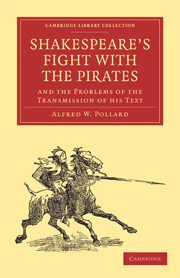THE IMPROVERS OF SHAKESPEARE
Published online by Cambridge University Press: 07 September 2010
Summary
IN our third paper we tried to establish bibliographically what was the normal history of the text of Elizabethan plays from the time the playwright handed his manuscript to the players; we then enquired what special evidence we had in the case of Shakespeare's plays, and finally applied the theories we constructed to the history of his text down to the publication of the Folio of 1623. We shall devote the first part of this our last paper to three deductions of some importance arising out of this survey.
I. The first of these is that, from our bibliographical standpoint, the readings of any edition of a play of Shakespeare's subsequent to the First duly registered Quarto cannot have any shred of authority, unless a reasonably probable case can be made out for access having been obtained to a new manuscript, or its equivalent. And to construct such a case all the variants in the edition must be brought together and considered as a whole.
Editors of Shakespeare, even the best editors of Shakespeare, have been too ready to accept or reject variants on what they would call ‘their individual merits’; and they have yielded, consciously or unconsciously, to the illusion that if a first edition printed (say) in 1597 is a good authority, a second edition printed within a year or two is also an authority, though perhaps not quite of equal weight.
- Type
- Chapter
- Information
- Shakespeare’s Fight with the Pirates and the Problems of the Transmission of his Text , pp. 81 - 104Publisher: Cambridge University PressPrint publication year: 2010First published in: 1920

